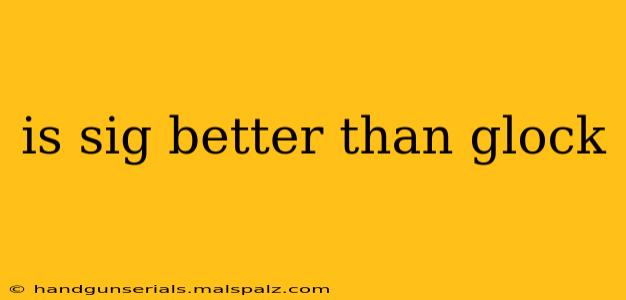SIG Sauer vs. Glock: A Deep Dive into Pistol Performance and Preferences
The age-old debate: SIG Sauer versus Glock. Both are titans in the handgun world, dominating the market for law enforcement, military, and civilian use. But which one reigns supreme? The answer, as with most things, is: it depends. This in-depth comparison will dissect the key features, performance characteristics, and subjective preferences surrounding these two popular pistol platforms, helping you make an informed decision.
Key Differences: Design and Ergonomics
Glock: Known for its robust polymer frame, simple design, and ease of maintenance, Glock pistols prioritize reliability and affordability. Their straight-line recoil system contributes to a manageable shooting experience, even for less experienced shooters. The consistent, slightly aggressive grip texture provides a secure hold, although this can be a drawback for those with smaller hands. Glock's simplicity extends to its trigger, which, while reliable, often feels somewhat stiff and lacks the refinement found in some other pistols.
SIG Sauer: SIG Sauer pistols often boast a more refined design, incorporating metal alloys in their frames (depending on the model) for increased durability and a more substantial feel. Many SIG models offer interchangeable backstraps, allowing for a customized grip to fit a wider range of hand sizes. The triggers on many SIG Sauer pistols are often lauded for their smoother, more refined pull, although this can be a matter of personal preference. SIG also incorporates more advanced features like improved ergonomics, ambidextrous controls, and sometimes more advanced sighting systems.
Performance Comparison: Accuracy and Reliability
Both Glock and SIG Sauer pistols are renowned for their reliability. However, subtle differences in design can impact performance.
-
Accuracy: While both manufacturers produce accurate pistols, many shooters report slightly higher levels of accuracy with SIG Sauer pistols, particularly in their higher-end models. This often stems from superior trigger designs and enhanced sighting systems. However, a skilled shooter can achieve excellent accuracy with either brand.
-
Reliability: Both Glock and SIG Sauer have a strong reputation for reliability, with minimal malfunctions under a wide range of conditions. The simplicity of the Glock design is often cited as a contributor to its robust reliability, while SIG Sauer's more complex mechanisms can, in theory, introduce slightly more points of potential failure, although this is rarely a significant concern in practice.
-
Recoil: The recoil characteristics are generally manageable in both, but users may notice a slightly sharper recoil with Glock pistols due to their generally lighter polymer frames. This is again a matter of personal preference and shooter experience.
Features and Options: A Look at the Details
Glock: Glock's strength lies in its simplicity and affordability. Its wide range of models caters to various needs, from compact concealed carry pistols to larger service-sized options. They are renowned for their ease of maintenance and readily available parts. However, customization options are generally more limited compared to SIG Sauer.
SIG Sauer: SIG Sauer offers a broader range of features and customizations. Many models feature improved ergonomics, ambidextrous controls, and more advanced sighting systems (including optics-ready models). They also offer a wider array of finishes and materials. However, these features usually come at a higher price point.
Conclusion: The Verdict
There's no single "better" pistol between SIG Sauer and Glock. The optimal choice hinges on individual needs and preferences.
-
Choose Glock if: You prioritize affordability, simplicity, reliability, and ease of maintenance. A straightforward, no-frills design is what you're after.
-
Choose SIG Sauer if: You desire a more refined shooting experience, appreciate enhanced ergonomics and features, and are willing to pay a premium for increased customization and potentially improved accuracy.
Ultimately, the best way to determine which pistol suits you is to handle both, if possible, and to shoot them. This hands-on experience will provide the most accurate assessment of which pistol feels right and performs best for your specific needs.

